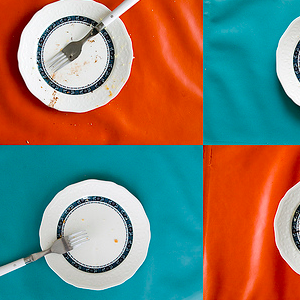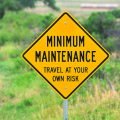Plates

I heard this short story in the form of a dialogue recently:
Grab a plate and throw it on the ground.
-Okay.
Did it break?
-Yes.
Now say sorry to it.
-Okay.
Did it go back to the way it was before?
-No.
Do you understand now?
There are at least three lessons in the story:
1. If someone has hurt you, it doesn’t have to be magically okay. It will probably continue to hurt for a while.
2. If you’ve hurt someone else, you should do everything you can to make it right—but you also shouldn’t expect it to be completely fixed.
3. Whenever possible, avoid these situations in the first place. Don’t be careless with plates, or with people.
###
Image: Mountain Bread








38 Comments
Hey Chris!
What a beautiful small article. It’s not very often, that you read so much truth in a few simple lines. Love it!
Greetings from Germany!
Dominik
This is cool, thanks for sharing. Trust, Respect and Admiration all take time to earn between people and once one of these are broken or hurt it takes times to rebuild them. “I’m sorry” only works if the actions that come after it are heartfelt, sincere and true.
Always a good idea not to hurt others. God Bless. There are some monsters out there.
Simple and profound. This should be the backbone of all customer service philosophy.
-Kevin Avery
this piece really hit home. as someone who has been known to act first and think second, the visual of the plates really helped me see (& feel) the damage this can do. thanks Chris.
Awesome Chris. It’s important that we handle all plates, not just fine china either, carefully. Regardless of shape, size, price, where it’s from, etc… all plates are fragile. Handle with care.
Also: Don’t follow all advice you get; think for yourself.
Best argument ever for paper plates!
While this is very true, I hope that sometimes super glue will help heal the hurt, because we all make mistakes. I love that this community is so very conscientious of the people around them. <3
I personally think that most people say “Sorry” because it is the “expected norm” of the society, and I don’t feel better if someone who just say sorry, but does not make the effort to alleviate the situation.
if you are truly sorry and care for my feelings, would it hurt if you just take some actions to SHOW that you are truly sorry?
Talk is cheap, but actions are the way to show your intention.
Just saying sorry won’t do, I’m sorry to say.
Good reminder, Chris! I have heard about a similar experiment done with kids to teach them about the mental scars left by bullying. You give them a piece of paper, tell them to crunch it into a ball and then make it smooth again. No matter how hard you try to make it good, it will never be like it was. Making it visual helps kids (and adults, I believe) understand the results of your actions.
But consider Kintsugi, the art of broken pieces.
Sometimes, with care and the right kind of bonding, we become more beautiful and more cherished after breaking…
Thanks Chris this is very clear and important.
From my perspective as a mental health professional, there is no good reason to hurt someone you love. The only part of you that would do that would be your ego-mind because it wants to be in control or have power over another.
That mind is not who you are, it is the survival mind. Your higher-mind has the capacity to care, have compassion and love. This is the same mind that is about awareness and consciousness.
Always know which mind us running you in all your interactions. You can always choose to be kind instead of zapping someone. It will save breaking any more plates.
Thank you for sharing this simple, but thought provoking information. Is it on your fb site so I can share it?
So many lessons… So little time!! Love the simplicity of these.
nice… wonder why it was easier to understand as an image than in print… at least for me.
As I posted on facebook, I have a problem with this analogy. If you perceive yourself as hurt and broken you will live in that reality and not be able to love. You will deny others being able to love you, using your victimized mentality as a shield proclaiming how can I love you when you broke me? No one can make you angry or upset or feel guilt, we do that to ourselves. We alone have the power, and so instead remember that you are whole and complete and perfect.
Thanks for the lovely message! It brought to mind the following rhyme from my old autograph book:
“Words and Eggs should be handled with care
’cause words once spoken
and eggs once broken
can’t be put together again!”
(Author unknown)
What a beautiful reminder to treat people with a little more care!
Some great life lessons in this analogy… Thanks for the share this morning!
What a great little story with a lesson. I get why nicole above says no one can make you upset – we do this to ourselves. But as Sylvia said up top, there are some monsters out there, including my ex who uses that argument after hurtling some abuse. Then it’s like adding insult to injury to blame the injured for feeling bad. But back to the point, you can appologise and it may soothe, but it doestn’t put the plate back together. Only hard work and glue can do that. But forgiveness is magical food for the soul.
If you glue that plate back together – it will be stronger than it was in the first place 🙂
Though the story is easy to understand, I am happy that I am not a plate and some things can be fixed (a lot of things actually), because I can help fixing them myself and do not entirely depend on outside sources to do so.
Perfect timing with this post, thanks. Today I’m explaining to my kids why something that has happened in my past still has a profound effect on me and this, along with the piece of paper analogy (thank you Christine ^^^^), explains it perfectly.
Neat
Great article Chris 🙂 Liked the 3rd point which is very true
I can see I’m in he minority with this one. I see this post on social media a lot and I find it to be one of the most disempowering posts. You are not broken; you will mend.
Even though I have forgiven a superior who tried to humiliate me in an email I still see a broken plate. And for what I can tell that plate will be forever broken.
Such a great article: short but powerful. Looking at relationships and responsibilities as plates…
This post is simple, yet genius, and it comes at a time when I am simultaneously hurt by and have hurt another person.
Uncanny……I came to this lesson yesterday. I was careless with two people and was stung with reprimands in return. It probably damaged the relationship. This is a small town of 400, so that counts for a lot.
There is so much truth in this story in terms of how we are as human beings. This is of course the best advice: “Don’t be careless with plates, or with people.” It can be so hard to regain trust once it’s been spoiled. But, like Marianne said above, we all make mistakes some time so hopefully forgiveness can be the super glue that will bring us back together.
thank you for inspiration, Chris! this story with the plates is so easy and so important to keep in mind when we start to fight for something… here my thoughts to it (in German ;-)) – http://petranovskaja.com/konfliktmanagement/
It’s not my first time to go to see this web page, i am visiting thks web page dailly annd get pleaant information from here
daily.
There is so much truth in this story in terms of how we are as human beings. This is of course the best advice: “Don’t be careless with plates, or with people.” It can be so hard to regain trust once it’s been spoiled. But, like Marianne said above, we all make mistakes some time so hopefully forgiveness can be the super glue that will bring us back together.
This is so interesting, thanks for sharing
This story is disempowering to me as well, and over-simplistic, in several ways.
Humans are, luckily, really nothing like plates. If they feel they are, then they will need to expect and accept the high chance to be broken at some point, but not always with abusive intent (even if any mishandling may feel deliberate to them). From the plate’s perspective, it will always be and remain a victim.
If the plate expects to be completely protected from damage, it would need to be just a decorative plate – which still gives no guarantee of complete preservation, and could be an insult to its real purpose and potential anyway – so, is probably actually not desirable, practical or useful.
Humans are not passive like plates, but have plenty of self-healing powers, if they are willing to discover and use them. However, negative expectation will reduce these. Consider the reality in nature, that a broken bone can actually grow together stronger (!) than before the break…well, that is something to keep in mind, how the potential power of nature truly works.
Humans are rather resilient and would not break so fully immediately, like a plate. The story, basically gives the plate just a single chance to fall – and then, it actually is completely dead.
What happens, if the plate-smasher walks away, and someone else, innoccently comes along and picks up the pieces and puts them back together…are they still going to be blamed as well and suffer the consequences of the previous damage, despite their effort?!
In terms of relationships it would mean: never date a person, who has experienced a break up before, eh? How very sad and even unwise this would be.
So, this story is, to me, a very old-fashioned, one-dimensional and pessimistic view on how to deal with challenge and conflict, and omits the perspective of possible growth as a human.
By all means, what it possibly wants to say is: be nice to people (and things) whenever you can – but stuff happens and the responsibility how to deal with any knock is up to the “plate” as well!
Your comments are welcome! Please be nice and use your real name.
If you have a website, include it in the website field (not in the text of the comment).
Want to see your photo in the comments? Visit Gravatar.com to get one.